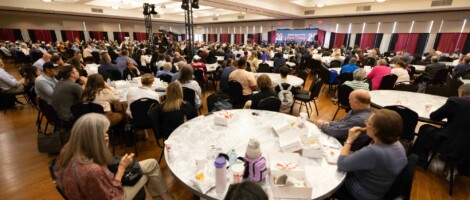Panel finds differing views on women in ministry not a barrier to collaboration in God’s mission
by Bonnie Hirschfeld on November 12, 2024 in News

“We’ve had conversations about the role of women in ministry for the past 35 years, perhaps even longer… We are trying to listen to each other and to have a representative sample of the views based on biblical interpretation in the Texas Baptists family,” Julio Guarneri, Texas Baptists executive director, said to attendees of a special panel, entitled “Biblical Perspectives on Women in Ministry,” at the 2024 Texas Baptists Annual Meeting.
Guarneri moderated the panel, designed to be a respectful conversation about the role of women in ministry featuring Baptist leaders with varying viewpoints. The event drew just under 700 attendees.
Panelists included Todd Still, dean of Truett Theological Seminary at Baylor University; Malcolm Yarnell, III, research professor of theology at Southwestern Baptist Theological Seminary; Dwight McKissic, pastor at Cornerstone Baptist Church in Arlington; Maddie Rarick, pastor at Meadow Oaks Baptist Church in Temple; Miguel Lopez, pastor at First Baptist Church in Duncanville; and Steve Bezner, pastor of Houston Northwest Church.
Guarneri began the discussion by thanking the panel for participating.
“We know it's not always easy to talk about this in a way that is friendly and respectful, and we’re happy you’re here,” he said.
The panelists began by introducing themselves and explaining their connections with Texas Baptists. All have deep connections to Texas Baptists, including studying at partner institutions and worshiping and serving at affiliated churches.
Differing views on women in ministry and leadership
Guarneri then asked the panel to describe any formal position on women in vocational ministry from their respective contexts and how those positions related to the panelists' individual convictions.
Still began by stating Truett Seminary’s official position on women in ministry, explaining that they are both affirmed and celebrated. He agreed with the seminary’s position, noting that “we are committed to ministerial, moral and personal integrity as men and women called by God.”

Yarnell expressed that Southwestern Baptist Theological Seminary aligned itself with the views of the 2000 Baptist Faith and Message. He added that he does not believe that a difference of opinion on this matter is reason for division within the denomination.
McKissic arrived at the discussion on women in ministry more recently, saying that words like complementarianism and egalitarianism were not common in his upbringing. Upon reflection and meditation in the Bible, he came to the conclusion that Scripture never forbade women from holding leadership positions. He argued that the often quoted 1 Timothy 2:12 was in response to a cultural issue, not a theological one.
“Let’s move past arguing about the head [office], let’s work on advancing the kingdom,” McKissic said.
Rarick’s church upholds the 1963 Baptist Faith and Message and affirms women in all areas of ministry and leadership. She explained that her church follows a congregational model, where they emphasize leadership based on gifting, not gender.
Lopez affirmed the 2000 Baptist Faith and Ministry, adding that he believed men and women were given different purposes within the body of Christ. Both sexes should be encouraged to grow to their “fullest redemptive potential,” but in regards to a pastoral office, he believes only men are called.
Finally, Bezner spoke of the journey his church has been on to determine their beliefs on the issue. He said that when he first took over pastorship of the church, women were not allowed to pray on stage or introduce a worship song, among other restrictions. After much prayer and biblical study, the church revised their position so that women could serve most roles, although eldership is still reserved for men. Clarifying and praying over these positions, Bezner said, has reduced strife in the church.
Next, panelists shared the biblical foundations of their convictions about women in ministry.
Still, McKissic and Rarick all quoted the Pentecost in Acts 2 as a passage that greatly influenced their beliefs. In the verses, women receive gifts of the spirit, including prophecy, alongside men. They also listed the many women named in the New Testament as leaders in the early church and the women who first told the apostles of Jesus’ resurrection.
McKissic found a passage in Revelations 2:20-21 especially convicting. In it, Jesus admonishes a church for listening to a woman’s false teachings. He does not focus on the woman’s sex but rather on her false teachings.
“I found it interesting that Jesus addressed the content of what was said, not the container,” McKissic said. “He had an opportunity to say that she had no business up there [preaching] because she was a woman, but he never addressed it. If that was the core issue, I think he would have addressed it… If Jesus could approve of a woman in a co-ed group addressing a New Testament church, why can’t I?”
Bezner expressed his belief that reading passages about women in leadership should be explored contextually. He shared that when his church was creating their own stance on the issue, the subject of greeting each other with a holy kiss provided clarity.
“I’ve been to a lot of Baptist conventions, and I’ve never been greeted by a holy kiss. I mention that to say, once we realized [a holy kiss] was a very plain commandment given in the New Testament… was a contextual greeting, we wanted to approach the other commands with a similar level of contextual observation.”
This included commands in 1 Corinthians 14 and 1 Timothy 2, in which Paul instructs women not to speak in church.
Conversely, Yarnell and Lopez expressed that there were passages in the Bible that pointed to specific roles for men and women. Both emphasized that women have important roles in ministry but not in the pastor's office.
“My understanding is that pastoral leadership is restricted to God-called men, but that does not mean that women do not have voices or roles as much as men in the establishment of the doctrine of the church through congregational conversation,” Yarnell said.
Lopez posited that Adam was created first in Genesis for a reason, because he has specific responsibilities and a leadership role. When the Fall happened in Genesis 3, Lopez said, it was a result of Eve leading instead of Adam. Because of this Fall, there is contention between the two genders concerning leadership.
Valuing unity and denominational cooperation
When asked about their greatest concern regarding the subject of women in ministry, panelists noted the unnecessary division the discussion can garner, the potential for distraction from other possibly more important issues facing believers and the prospect of individuals misinterpreting what the Bible says on the matter.
“My deepest concern is that this not become an issue that divides us apart from cooperating together for the gospel,” Bezner said.
Rarick agreed, pointing to the wide range of beliefs when it comes to this topic. She also urged attendees to continue having discussions about the issues, especially with people with differing opinions.
“I’ve appreciated the diversity [of those beliefs] on this panel. And I think that’s something that’s important to me, that we continue to hear from a variety of voices,” she said.
As the panel came to a close, Guarneri asked panelists what they valued about being a part of Texas Baptists and how they continued to enjoy fellowship despite differences.
For Yarnell, being part of the Convention is a commitment to proclaiming the gospel and glorifying the Lord as a unified group. Having differing opinions on issues that are not at the heart of the gospel message does not have to sow division.
“We need to keep our focus on the main thing, and that is to glorify God and Christ by proclaiming the Word together,” he said.
McKissic cited the diversity of Texas Baptists as his favorite part of the Convention.
“I love that we are a family where we recognize that this is diversity in our unity and unity in our diversity,” he said.
Guarneri concluded the panel by thanking the panelists and attendees for their participation in the event. He warned that extremes on either side of the issue can cause division.
“I’m glad we had this conversation. I think it shows that in our diversity, we can still join together and collaborate for the mission of God,” he said. “When we keep the tent big within orthodox Christianity and within biblical authority, we are better together.”
Strengthening a multiplying movement of churches to live out the Great Commandment and Great Commission in Texas and beyond.
The ministry of Texas Baptists is made possible by giving through the Texas Baptists Cooperative Program, Mary Hill Davis Offering® for Texas Missions, Texas Baptists Worldwide and Texas Baptist Missions Foundation. Thank you for your faithful and generous support.
Subscribe to receive stories like this one directly to your inbox.
We are more together.
Read more articles in: News, Annual Meeting
More from Bonnie Hirschfeld
- Workshop attendees encouraged to make an impact through missions, discipleship
- Minister Spouse Fellowship provides community, encouragement to attendees
- Texas Baptists Hunger Offering luncheon offers ministry report, honors top givers
- Worship session focuses on partnerships and the presence of God’s kingdom
- Guarneri shares clarified calling during executive director’s report